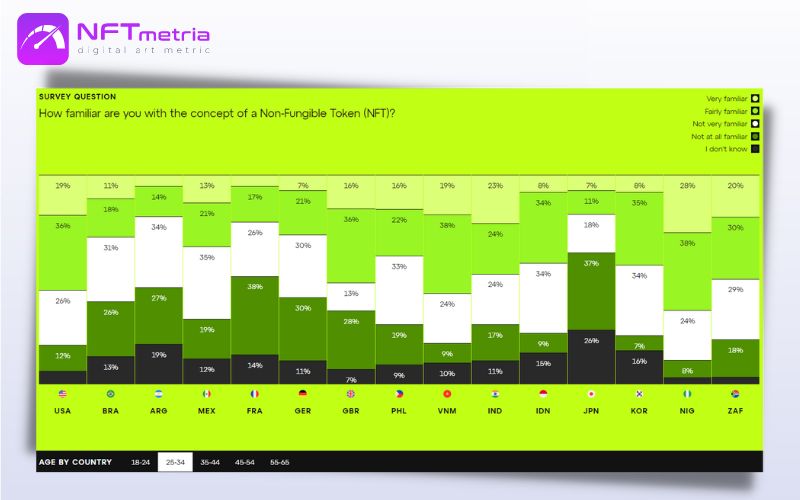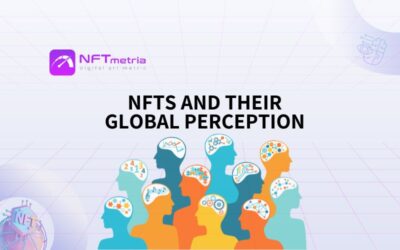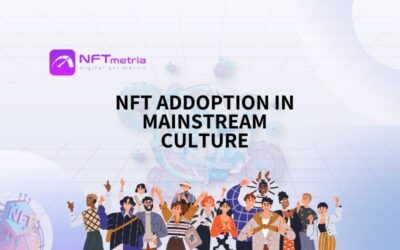In collaboration with YouGov, Consensys conducted a global Web3 and NFT perception survey across 15 countries spanning all continents. This multinational study aimed to provide a global and regional perspective on people’s perceptions of cryptocurrencies, NFTs, Web3, blockchain, and the metaverse. It also sought to gauge people’s sentiments about the current state of the internet and whether recent bankruptcies of centralized financial crypto companies had impacted the sector.
So what conclusions can we draw from such a comprehensive report?
Global Cryptocurrency Awareness and Limited Understanding of Web3
Surprisingly, 92% of respondents globally reported having heard of cryptocurrencies. However, awareness levels varied across countries, with Nigeria, South Africa, and Brazil leading in awareness. Despite this global cryptocurrency awareness, only 8% of respondents considered themselves very familiar with the concept of Web3. This highlights a gap between public perceptions of Web3 and its potential to address issues related to privacy, identity, and digital ownership on the internet today.
Regarding familiarity with NFTs, more respondents were unfamiliar with NFTs globally. The US, India, South Africa, and especially Nigeria are the countries that are the most familiar. On the contrary, South American and European countries together with Japan have the highest proportion of respondents who are not familiar with it.
Among respondents familiar with the concept of NFTs, 76% of respondents in the UK have never owned an NFT, compared to only 24% of respondents in Vietnam.

Desire for Increased Ownership and Data Privacy
Even among respondents unfamiliar with Web3, many expressed support for its underlying concepts. Half of the respondents believed that Web3 adds value to the internet, and 67% felt they should have ownership rights over the content they create on the internet. Additionally, only 38% of global respondents felt adequately compensated for their online contributions. Data privacy concerns were also prevalent, with 83% of respondents prioritizing data privacy, 70% believing they should share in the profits that companies make from their data, and 79% desiring greater control over their online identities. These findings underscore the importance of educating people about how Web3 can grant them greater control over their online identities and ownership, enhance privacy, and enable them to share in the profits generated by companies from their online activities.
Regional Disparities
Notable disparities emerged when comparing behaviors across countries. European nations displayed greater skepticism toward cryptocurrencies, a sentiment often mirrored in countries like Japan and South Korea. In these countries, cryptocurrencies were more strongly associated with negative concepts such as scams, money laundering, and speculation. In contrast, most countries in Southeast Asia, South America, and Africa generally exhibited more enthusiastic attitudes toward cryptocurrencies and Web3. In these regions, associations with concepts like the future of money, digital ownership, or alternatives to the traditional financial ecosystem were stronger. Additionally, in countries like Argentina and Nigeria, where the local currency is unstable, cryptocurrencies were seen as an important means of accessing global capital and protecting against inflation.
From “Users” to “Builders”: A Paradigm Shift
The survey results revealed a gap between the desire for an internet that provides greater control over data and identity, fairer profit distribution for creators, and awareness of Web3 and NFT as a potential solution. Many respondents felt they were creating value online but were not fairly compensated. This presents an opportunity for internet users to adopt a “builders” mindset, leveraging Web3 and NFT products to address issues related to online ownership, identity, privacy, and creator monetization.
Methodology Note
A total of 32 questions were administered to a representative sample of each country’s population between April 26th and May 18th, 2023. YouGov conducted interviews with 15,158 individuals online across 15 countries: Argentina, Brazil, France, Germany, India, Indonesia, Japan, Mexico, Nigeria, South Africa, South Korea, The Philippines, the UK, the US, and Vietnam. The collected data was weighted based on gender, age, and region to ensure representation of national populations and was analyzed by YouGov consultants.











